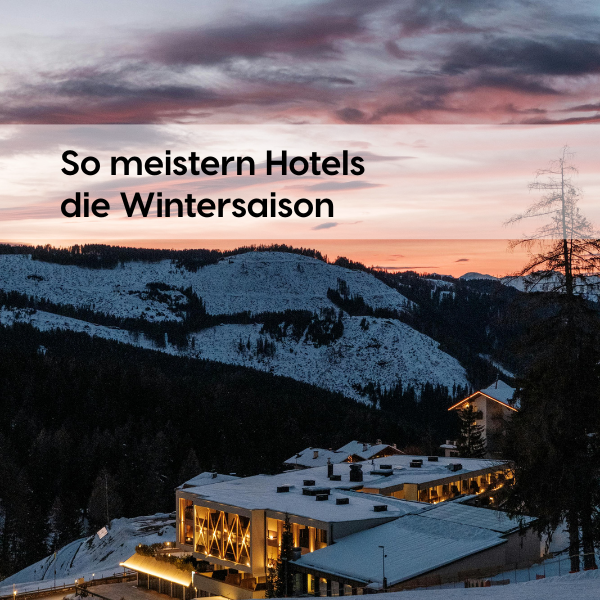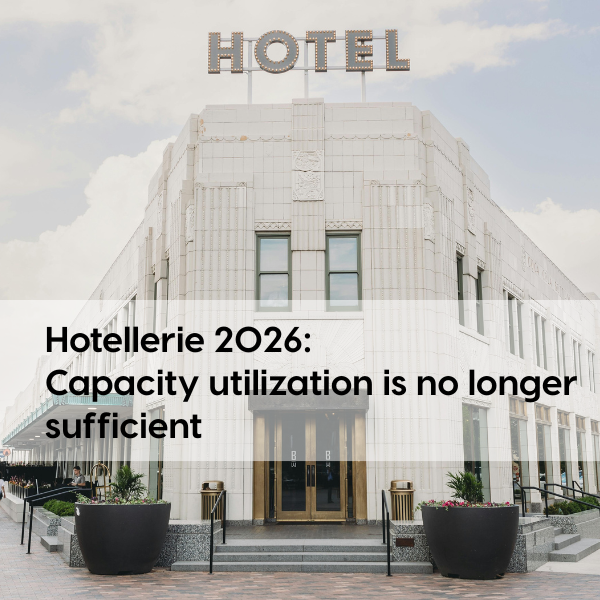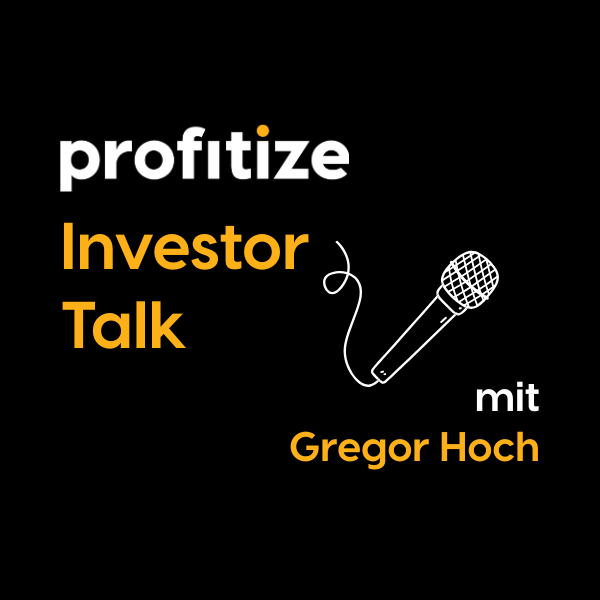Financial management
Investor Talk with Till Schäfer
Revenue is like snow – it covers everything.
.png)
What numbers often hide and why operational clarity is vital for hotels.
Till Schäfer is Managing Director of Finance at Falkensteiner Hotels & Residences (part of the FMTG Group). Previously, he held senior finance positions at Kempinski Hotels and Starwood Hotels & Resorts (now part of Marriott International), with assignments in Germany, Switzerland, and the Middle East. As Head of Finance at the FMTG Group, which is invested in profitize, he contributes his experience to a solution that bridges operational reality and digital management — creating clarity where many hotels still recognize too late what is really going on.
Mr. Schäfer, you originally studied law. How did you make the switch to hospitality?
That was actually a family tradition — I could have joined my father’s law firm. But in the end, things turned out differently. During my studies, I worked a lot in the restaurant business and realized it suited me. So, I completed additional training in hotel management and really went through all the departments: cutting fruit salad in the kitchen at five in the morning, folding towels in the laundry. That helped me understand operational processes. At the end of my training, I moved into accounting — still with ledger and pencil back then. And that’s when I realized: the world of numbers suits me.
How did it continue?
I then started as an accountant at the Hotel Vier Jahreszeiten in Munich with Kempinski, later moved to Frankfurt, and then to Starwood (now Marriott) in Nuremberg and Hamburg. Together with my wife, we then returned for two and a half years to Kempinski in the Swiss seasonal hotel business in St. Moritz. And that’s when the call came: the Middle East. I spent five years in Dubai, overseeing all the hotels in the Middle East and Africa, on average 25 properties, in some of the most exciting locations in the world. When our second child was born, we returned to Europe.
What role does operational experience play in financial management?
The hospitality industry works differently from many other sectors, which makes operational management particularly demanding. If a car manufacturer produces 100 vehicles, exactly 100 steering wheels are needed. In a hotel, however, some flexibility is required: one guest might have two glasses of orange juice, another none at all. Some guests require more attention, others less. It is a service business — not an exact science. That is precisely why it is important to understand operational processes and know where to intervene.
I would not presume to explain to a hotel manager how housekeeping works. But I have a solid understanding of how and where costs arise and what is operationally necessary — also because I learned the business from the ground up.
You say: “Revenue is like snow — it looks good, but it covers everything.” What do you mean by that?
Revenue is often the first number everyone looks at. But it tells you nothing about profitability. Revenue can look fantastic, but if costs get out of control, nothing is left. And many only realize this too late. The snow melts, and suddenly you see what’s underneath. That’s why the focus must shift much more toward cost management.
Many hotels have become accustomed to rising prices in recent years. But in the current economic situation, I see little potential for further price increases. You have to make strategic choices: where do I want to invest, and where might I consciously choose not to?
Take breakfast as an example: if my goal is to offer the best breakfast in town, I cannot at the same time say: “You may only spend two euros per guest.” That doesn’t work. Once you make a decision for quality, you have to stick with it — even if occupancy is low and unit costs rise.
It is also important to closely examine what truly adds value for the guest, rather than acting according to “we’ve always done it this way” or “everyone else does it like this.” Clarity in strategic direction, combined with a constant questioning of your own processes and standards, helps ensure decisions are made consistently.
What are typical cost drivers that are often overlooked?
Often, it’s the many smaller and larger fixed costs. One example is the internet provider. Many simply pay the same price year after year, plus indexation, without questioning whether the price is appropriate. Yet there is often room for negotiation. You can say: “I’ll sign for three years, but then I need a 30% discount.” These kinds of discussions need to happen. In the end, these small expenses add up. Hospitality is a business where every euro counts.
How can hotels better analyze their costs?
By going into detail. If the P&L shows a line item “administrative expenses,” you need to know what’s included: credit card fees, IT costs, payroll accounting. And you need to compare: how much do other properties of similar size and structure spend in these areas?
Benchmarking — why is it so crucial?
Independent hoteliers often don’t have this comparison. They only look at whether things are better or worse than the previous year. But that doesn’t tell them if they are doing well. There is no external standard. The first step is: I want to know if my costs are in line with the industry. If others with similar products spend 5% of revenue on administration and I spend 8%, then I should take a closer look. That’s the entry point into benchmarking.
And how can profitize help with this?
With profitize, it could potentially become possible to create anonymized industry benchmarking. To my knowledge, this does not yet exist, especially in the vacation hotel sector and including the data and experience of independent hoteliers. Until now, benchmarking projects usually focus on large chains and city hotels.The goal is not to compare individual hotels directly, but to provide aggregated evaluations across many properties. For example, you can see that in hotels of your size, the average personnel cost ratio is 30%. This creates comparability and helps to better assess your own position.
Why is profitize particularly interesting for hotels without their own accounting department?
Smaller hotels often leave their accounting to a tax advisor, which is sufficient to meet legal requirements but usually not detailed enough for operational management. Cost centers, booking depth, KPIs, and comparability are missing. Profitize can support here by providing the hotelier with industry-specific standards. This gives them a foundation to make adjustments together with their tax advisor. Initially, this means extra effort, but the gain in transparency is significant.
How important is a standardized approach to financial metrics — especially in larger hotel groups?
Very important. In a meeting where colleagues from different countries are present, everyone brings different reports: one Excel, another a PDF, a third something from the scheduling software. A lot of time is spent just trying to understand what is actually in front of you. When everyone works with the same KPIs, the same data logic, and the same reporting formats, you save these basic discussions and can focus on the actual content.
How does profitize help in everyday operations?
Profitize enables a unified presentation of the numbers. This means that everyone sees the information relevant to them. Owners need different metrics than a head chef or a regional controller. Everyone accesses the same platform, sees the current status, and the numbers relevant to them. This reduces misunderstandings, speeds up meetings, and greatly simplifies communication within the company.
How important is visual representation?
Very important. I’m a numbers person — I can quickly spot anomalies even in a 30-row table. But many others cannot. For a head chef, it might be better to see a spike in a chart and immediately know: something’s wrong. The goal is to present numbers in a way that is understandable and actionable for everyone on the team.
How does profitize help make operational decisions faster?
The big advantage lies in consolidating relevant data — not just from accounting, but also from systems like inventory management, staff scheduling, or energy suppliers. When key metrics such as personnel costs, cost of goods sold, or energy consumption are visible in one place, a complete picture emerges. You also spot quickly when something is off track.
An example?
In our hotels, energy consumption is measured electronically in many areas. In one case, a hotel was already closed, but the gutter heating was still running. Previously, this would only have been noticed weeks later on the electricity bill. Today, you can see it early and intervene immediately. That saves real money. And this can be applied to many other areas — for example, inventory use or personnel costs.
What advice do you have for young hoteliers?
Make it a habit to check your numbers daily — whether it’s occupancy, cost of goods, or staff schedules. Those who do this consistently quickly develop a sense of where things are going off track and where adjustments are needed. My book recommendation also fits here: Atomic Habits by James Clear. It shows very well how small, regular routines can have a big impact in the long term — and the same applies to controlling.
Mr. Schäfer, thank you very much for the interview.
Oder kontaktieren Sie uns.
Simply contact us via email. We look forward to hearing and reading from you.
hello@profitize.io


.png)
.png)
.png)
.png)
.png)
.png)
.png)

.png)
.png)
.png)
.png)
.png)
.png)
.png)
.png)
.png)
.png)

.png)
.png)
.png)
.png)
.png)

.png)
.png)
.png)
.png)


.png)
.png)
%20(600%20x%20400%20px).png)
%20(800%20x%20600%20px).png)

.png)



.png)



